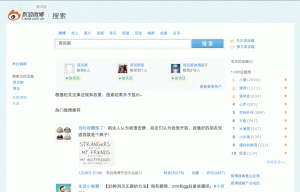3 May 2013 | Uncategorized

Chinese censors have been working overtime on social network Weibo after users noticed that the new headquarters of state propaganda sheet the People’s Daily News (see pic) looked, er, a bit phallic.
According to the South China Morning Morning Post, Weibo searches for “People’s Daily” and “building” appear to show that the terms have been blocked.
“It seems the People’s Daily is going to rise up, there’s hope for the Chinese dream,” quipped one Weibo user.
Padraig Reidy is senior writer for Index on Censorship. @mePadraigReidy
6 Dec 2011 | China
The new boss of CCTV, China’s state TV network, Hu Zhanfan, says it like it is.
He believes Chinese journalists should first and foremost be the Chinese government’s mouthpiece and those that don’t play ball won’t go far.
“The first social responsibility and professional ethic of media staff should be understanding their role clearly and be a good mouthpiece.”
Hu, a former newspaper editor, made these comments several months ago, but they only started causing a stir among Chinese web users over the weekend when the original Xinhua News report was posted on Weibo, China’s most popular microblogging site.
 One web user compared Hu to Nazi propaganda chief, Joseph Goebbels.
One web user compared Hu to Nazi propaganda chief, Joseph Goebbels.
Below are pasted some of Hu’s comments from that Xinhua report, translated by the University of Hong Kong’s China Media Project.
“A number of news workers have not defined their own role in terms of the propaganda work of the Party, but rather have defined themselves as journalism professionals, and this is a fundamentally erroneous role definition. Strengthening education in the Marxist View of Journalism and raising the quality and character of news teams is not just very necessary, it is a matter of extreme urgency.
“Concerning social responsibility and professional ethics, editor-in-chief Hu Zhanfan believes that the first and foremost social responsibility [of journalists] is to serve well as a mouthpiece tool. This is the most core content of the Marxist View of Journalism, and it is the most fundamental of principles.”
20 Sep 2011 | Asia and Pacific, China
It’s been in the pipeline for weeks. Ever since China’s version of Twitter, Weibo, was used by account holders to pressure a polluting factory to close down in Dalian and to expose dodgy goings on after a fatal train crash this summer in Wenzhou, the government has been making threatening sounds about the need for more controls over what and who can tweet.
Sina, the owner of China’s most popular micoblogging site Weibo has bowed to the pressure and, according to Chinese media, said it is setting up special rumour-quashing teams to stop the spread of “false information”. Sina chief executive Charles Chao was quoted as saying that as well as Sina stepping up efforts to delete rumours, the government should also make new laws to maintain “a healthy order on microblogs.”
For an example of the kinds of “false information” Chao is referring to, we can take a look at the most recent report of Weibo censorship. Internet activist Huaguoshan Zongshuji said his Weibo posts of pictures of officials wearing luxury brand watches, including Rolex, Omega and Piaget, had been deleted in the past few days. His posts drew many angry comments from other Weibo users about government corruption.
Weibo has over 200 million registered users, and the service has to deal with up to 75m comments and messages every day.
30 Jan 2011 | Asia and Pacific, China
Terms like Falun Gong, the Tiananmen Square Massacre and the names of high profile Chinese dissidents have long been censored in China, but now it’s the turn of country names.
 A search on Weibo — a twitter-like service owned by Sina — for the words “Egypt” or “Tunisia” in Chinese returns the message: “According to relevant laws, regulations and policies, the search results cannot be shown.” The names of the countries in English are not blocked.
A search on Weibo — a twitter-like service owned by Sina — for the words “Egypt” or “Tunisia” in Chinese returns the message: “According to relevant laws, regulations and policies, the search results cannot be shown.” The names of the countries in English are not blocked.
News wires are reporting that Sohu’s microblog has also blocked searches for Egypt.
The state news services, though, are covering the protests in both countries and regular searches on online Chinese search engines are not blocking the words.
This new and curious development follows recent anti-government protests in both countries. Riots in major Egyptian cities including Cairo and Alexandria have left more than 100 people dead. The unrest in Tunisia toppled the president. Protests are continuing over the choice of ministers for the interim government.
Global Voices Online is reporting that some Chinese bloggers have set up regular updates of Egyptian news on Weibo which comes up in searches for “Egypt” in English.
The censorship all seems a bit over the top. As one China-based western blogger observed: “Anything is possible, I suppose, but the very idea of Chinese activists being so inspired by the riots in Egypt that they’d try to implement the same tactics in China is so absurd it’s laughable.”



